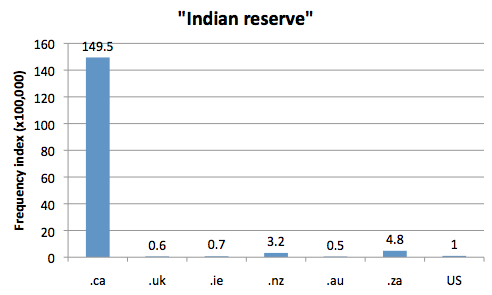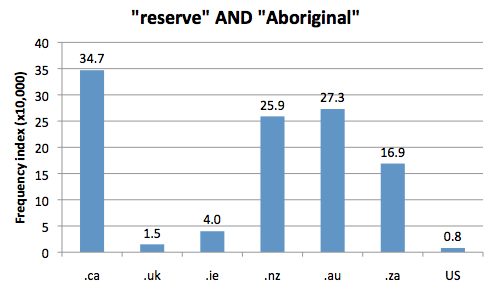DCHP-2
reserve DCHP-2 (June 2016)
1 n. — First Nations
an area of of land set aside by the government for the exclusive use of Aboriginal peoples.
Type: 5. Frequency — The term reserve refers to a parcel of land set aside by the federal government for the use of particular groups of Aboriginal peoples, known as bands, usually as part of treaty agreements. Some bands administer more than one reserve; sometimes more than one band shares a reserve. These pieces of land are often located in remote or isolated areas (see the 1999 quotation), although some have over time been incorporated into urban areas (e.g. Montreal, Calgary, Vancouver. Reserves are regulated by the Indian Act (see Indian Act); ownership of reserve land remains with the Crown (see Indigenous Foundations reference). Residence on a reserve is managed by band councils and the minister of Aboriginal Affairs and Northern Development and is generally reserved for band members and their families (see also status). The creation of the reserve system is rooted in the aims of French missionaries, who aimed to introduce Aboriginal peoples to a sedentary lifestyle (see Indigenous Foundations reference).
Although reserves are referred to as "physical and spiritual homelands", they were intended to permit colonial control and to free other lands for settlers. Although originally intended to facilitate assimilation into settler ways, the confinement of Aboriginal people to reserves actually served to preserve their culture and political cohesion; therefore, reserves act as primary sites of activism for matters such as land claim disputes (see Canadian Encyclopedia reference). Conditions on reserves are often poor, characterized by inferior government services, extreme poverty and insufficient housing (see the 2009 quotation).
The use of reserve to refer to 'an area of land set aside for the use of a specific indigenous group' is not exclusive to Canada, as it is also used in Australia, New Zealand and formerly South Africa (see OED-3, s.v. "reserve" (n)(5b)), as well as in the US. In the latter country, DAE (s.v. reserve (n.4)) dates back to 1805. Thus, reserve can likely be classified as a preservation from British English terminology in former colonies. The more common term in the US, however, is reservation (see reservation). Chart 1 shows that the term Indian reserve is most frequent in Canada, even when reserve is combined with Aboriginal (Chart 2).
See also COD-2, s.v. "reserve" (5), which is marked as used "in Canada", Gage-5, s.v. "reserve" (4), which is marked "Cdn.", ITP Nelson, s.v. "reserve" (7), which is marked "Canadian" and OED-3, s.v. "reserve" (n)(5b), which marks the term as "the usual term in Canada, Australia, and New Zealand, and formerly South Africa".See also: Indian reserve reservation treaty (meaning 1a) status on-reserve off-reserve rez ((2))
2 † n.
a tract of land set aside for a specific purpose by the government (historically Crown, Church and military) and now often environmental reserves.
Type: 2. Preservation — The term reserve is used to describe an area of land that is used for special purposes, such as preservation of wildlife or plants (see Gage-5, s.v. "reserve" (5)). Accordingly, OED-3 defines reserve as 'a location or area reserved for a particular purpose, esp. as the property or place of abode of a particular person or group of people, or in the interests of wildlife conservation' (s.v. "reserve" (n)(5b)). This particular meaning dates back to the 17th century, deeming its use in Canada a likely preservation from British English. Moreover, this particular meaning of reserve can be see as the basis for the development of its semantically narrowed form discussed in meaning 1.
See also: Clergy Reserves Huron Tract
References:
- COD-2
- DAE
- Gage-5
- ITP Nelson
- Indigenous Foundations "Reserves" Accessed 20 Aug. 2014
Images:

Chart 1: Internet Domain Search, 18 Apr. 2016
Chart 2: Internet Domain Search, 18 Apr. 2016